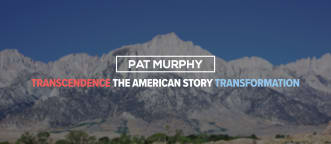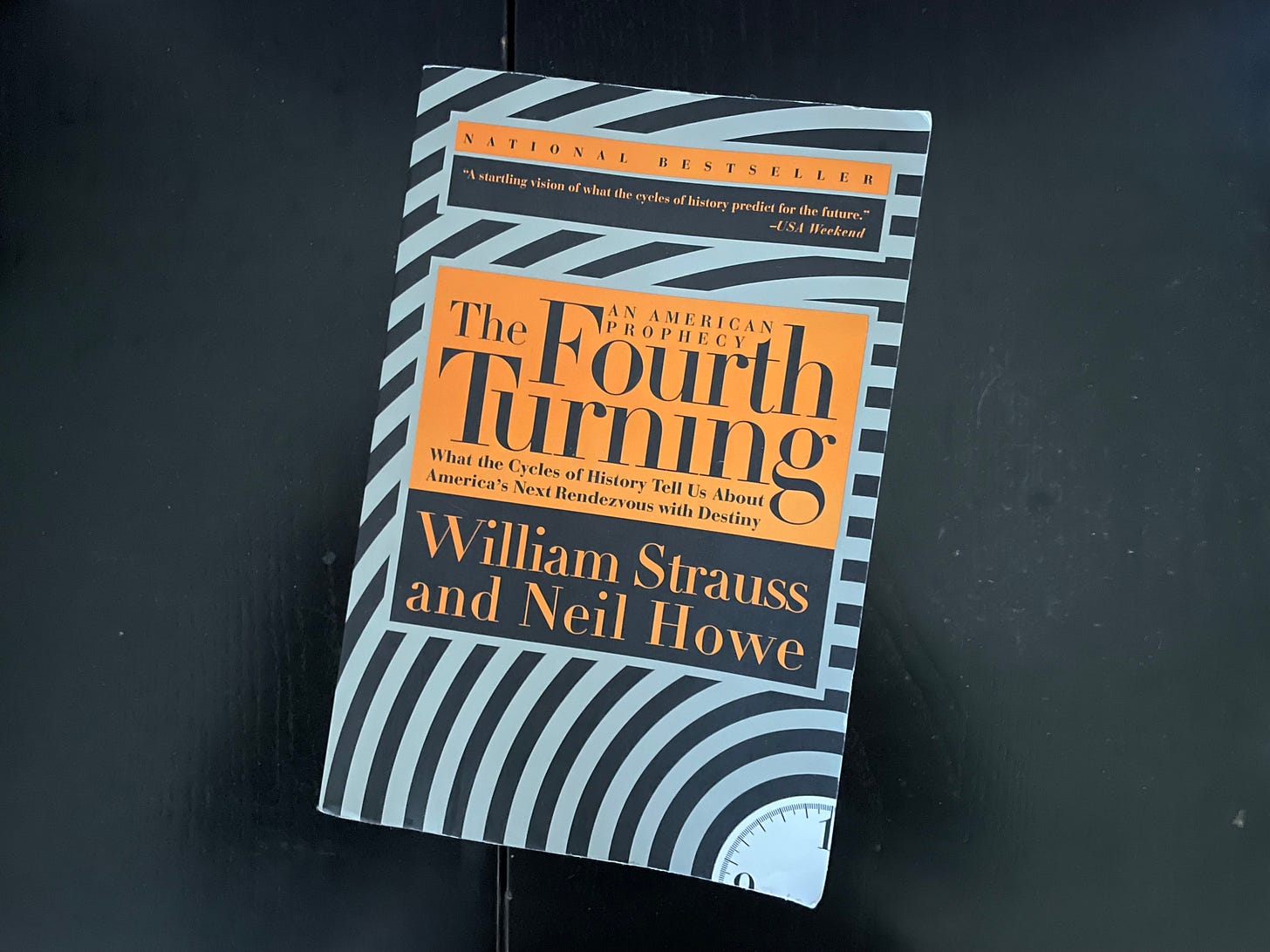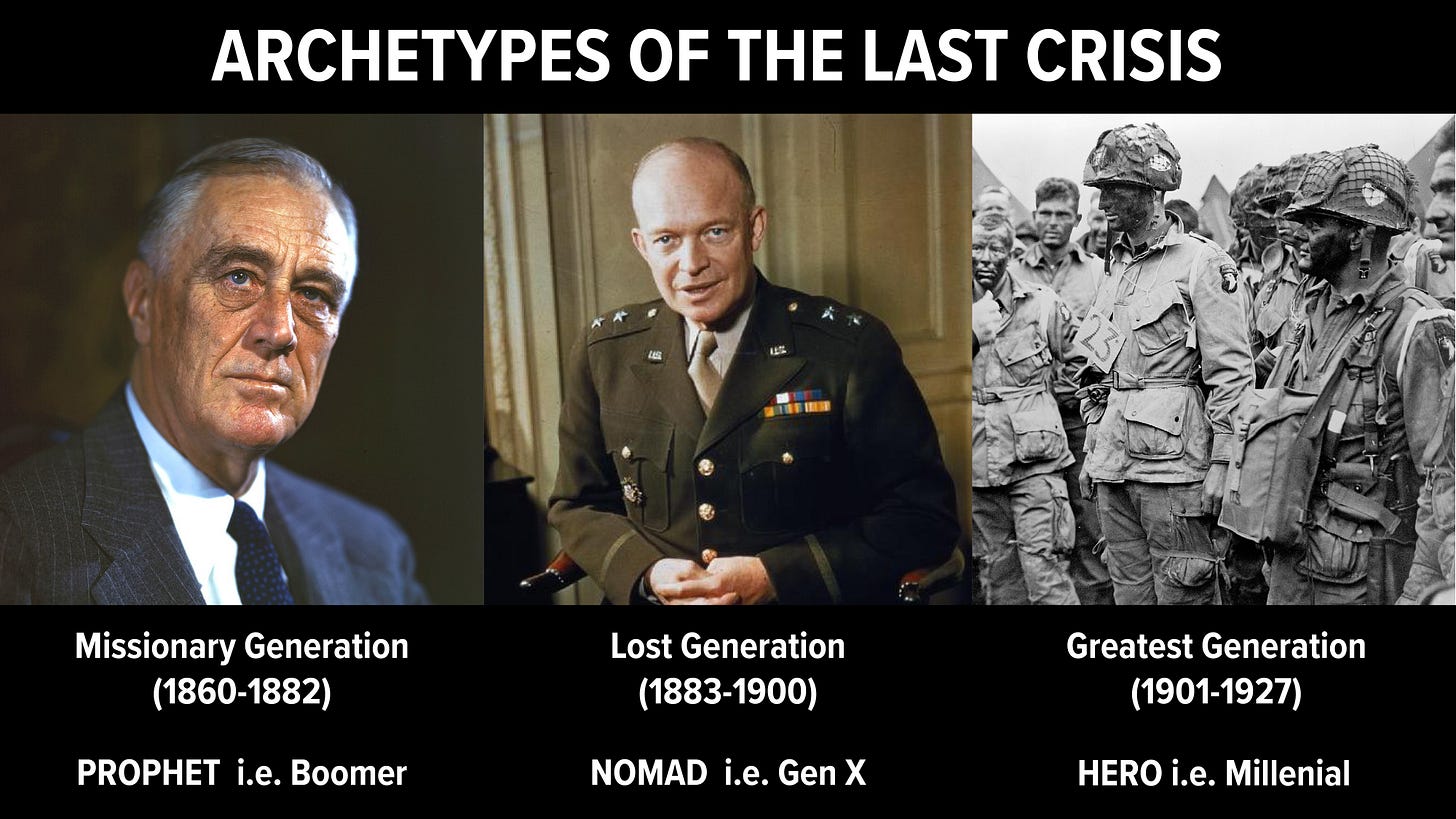Making Sense of Crisis
The Fourth Turning in the Seasons of History
A few months ago, I wrote that things were about to get weird in America. Boy did that prove true. Not that they weren’t already. And I’m sure they will only get weirder.
The events of October 7th, and the reaction here in the United States, was an X (twitter) rabbit hole I could not take my eyes off. The culture warriors never miss an opportunity to capitalize on a tragedy.
In real time, you could watch battle lines being drawn. Longtime political allegiances abandoned. In many corners, the deaths of innocent people were implicitly celebrated. In others, explicitly.
This is what happens in the absence of shared beliefs. It’s what happens when we don’t have a basic understanding of what America is and what we stand for. It’s all disintegrating before our eyes. At lightning speed.
But have we been here before? A fascinating book from 1997 suggests we have.
I. The Fourth Turning
Living in the east again makes me more aware of the changing seasons. As the last of the fall colors fade and the nights become long, dark, and cold, I reflect on the nature of change. I recently finished The Fourth Turning, by Neil Howe and William Strauss, which is all about change and the seasons of history.
The idea is that Anglo-American history has transpired over the centuries in four turnings. Each turning is roughly 20 years. The four turnings combined make up a saeculum, which is roughly 80 years. About the span of a lifetime.
The First Turning is a HIGH. Our last high started in 1946 and ended in 1964. America emerged from World War II as the dominant world power. There was a relatively even distribution of wealth and a strong middle class. There was a collective faith in institutions and a general consensus about how society should be run: Keynesian economics, anticommunism, and service to your community and your church.
For obvious reasons, the high was not all roses. Hence the AWAKENING, which is the second turning of the saeculum. Our last awakening was the Consciousness Revolution of 1964-1984: Civil Rights, the Counterculture, The Sexual Revolution, The Women’s Movement, and The Gay Liberation Movement.
While a lot of positive change came out of the Awakening (and while it must’ve been one hell of a ride), the changes from that period were not all good either. Hence the UNRAVELING, which is the third turning.
Our unraveling took place from 1984-2008. The burning of draft cards in the sixties led to the tax revolts of the eighties. Hippies became yuppies. The individualism of the groovy LSD-fueled sixties led to the “greed is good” ethos. The modest, GI-bill bungalows of the post-war period were no longer adequate. McMansions were in. The AIDS epidemic. Nirvana. Rodney King. The fall of the Soviet Union. The War on Terror.

Following an unraveling is the fourth and final turning, the CRISIS. We are in a crisis now. Author Neil Howe has placed the start of our current crisis period in 2008 with The Great Recession. As the theory goes, we still have a few years to go. The crisis will end around 2028, or even later.
The last American crisis started with the stock market crash of 1929 and ended with World War II. The crisis before that ended with the Civil War. The time before that? The American Revolution.
How will this one end? The 2024 Presidential Election? The 2028 Election? Another Civil War? An AI Revolution? A major economic crash? World War III? They all seem like good contenders.
But if history continues in the same fashion, the country will rally together against a common enemy. They will sacrifice their individual needs for the greater good. Civic engagement will become a new priority. Institutions will be reformed and strengthened. The 2030s will be high times. And the cycle will repeat.
II. Generational Archetypes

The authors identified generational archetypes, which correspond to the various turnings. The reason for the differences in generations has to do with which turning they are born into and come of age during.
The generation that comes of age during the crisis is called the HERO generation. This was most recently personified by the Greatest Generation. They grew up during the crisis period of the Great Depression and then sacrificed themselves in the war against fascism (both abroad and at home).
According to the theory, the Millennials will become the heroes of this crisis period. I know, I can hear the snickering back there.
The generation that comes of age during a high is the ARTIST generation. This is the Silent Generation. They were too young for World War II and too old for the counterculture. They came of age during McCarthyism and were largely conformists who valued safety and security. The nonconformists of the generation were the Beats.
The Silents fought in Korea. That war everybody forgot about. Joe Biden is the only Silent president we’ve had. It skipped from Great Generation members Kennedy, LBJ, Nixon, Carter, Reagan, and Bush Senior to Baby Boomers Clinton, W. Bush, Obama, and Trump.
Gen Z will be the next artist archetype.
The generation that comes of age during an awakening is the PROPHET generation. These are the Baby Boomers. They didn’t have to sacrifice during the Crisis like their parents did, and therefore didn’t have the same attitudes of conformity and rigidity. Naturally, they rebelled.
The prophets excelled at many things. It was the greatest era ever for music. They explored new realms of consciousness. They stopped an unjust war. They created the personal computer. They were great at rebelling against institutions (think Berkeley Free Speech Movement of 1964). But they’re not very good at running them (think expansionist universities today with astronomical tuition and crippling student debt).

The generation that comes of age during an unraveling is the NOMAD generation. This is Generation X. They were born during an Awakening. It’s a time when people are more interested in exploring their consciousness and different marital arrangements. So, child rearing is not really a priority. Gen Xers (“latchkey” kids) were left to roam all day without parental supervision. Cultural depictions of children during this time were not very positive. Like in Rosemary’s Baby or The Exorcist.
Not so with my childhood. Baby Boomers dominate the culture. So, when they decided it was time to have children, there was suddenly a national interest in children again. Ah, The Millennials. We were given a lot of attention. We were constantly told how special and great we were. The “Baby on Board” sign became commonplace in minivans on their way to soccer games. Parents were deeply invested in our future. And still are, even though we’re in our 30s now.
When the climax of a crisis takes place, the generations come together in unique ways. Last time, the Greatest Generation became the GIs and Rosie the Riveters of WW2 (i.e. Millennials). The reliable, straight-talking managers were a Nomad archetype, the Lost Generation, born between 1883-1900. This included Harry Truman, Dwight D Eisenhower, and George Patton (i.e. Gen X). The elder leaders were a Prophet archetype born between 1860-1882 and included FDR, Douglas MacArthur, and Winston Churchill (i.e. Boomers).
This is all assuming that we make it through this next crisis. As they say, history doesn’t repeat itself. It rhymes. There’s no guarantee that the American experiment will continue. Last time it took 600,000 deaths to work it out.
What will it take this time?
III. Turn, Turn, Turn

I find comfort in the idea of the Fourth Turning. Of seeing the trials and tribulations of history as part of the natural cycle of life. Just like wildfire is a necessary element for rebirth in the ecosystem, crisis serves its purpose.
We’ve had it good here in America for too long. We got greedy. Selfish. Divisive. Overfed. And concerned about stupid things. We took it all for granted.
But maybe that was all written in the cards.
We don’t appreciate what we have because we aren’t the ones who fled the Dust Bowl and fought the Nazis. Those who did are no longer with us. The memory is fading. Maybe crisis is a necessary element to make us appreciate the gift of life. And the importance of the American experiment. If we make it through the crisis, our descendants will only know the high times.
And then they’ll have to learn it all over again.
In his latest book, The Fourth Turning Is Here, Neil Howe references this poetic summary of the cycle from Jean De Meun, a French author in the 13th Century:
Peace makes plenty, plenty makes pride
Pride breeds quarrel, and quarrel brings war;
War brings spoil, and spoil poverty,
Poverty patience, and patience peace
So peace brings war, and war brings peace





